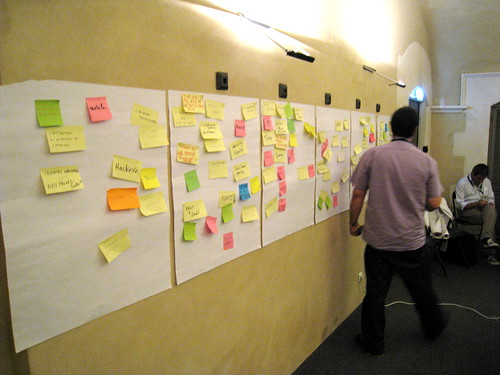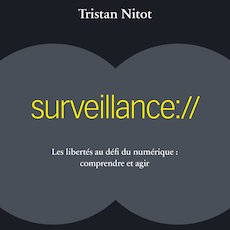I was invited to hold a workshop at Lift France '09 which title was What's wrong with the Web. It looked like the topic was interesting, because it was the first workshop to reach the fully-booked status (with 25 seats) and we ended up with twice as many people in the workshop that we wanted! No doubt, LIFT participants – just like me – do think there are things to improve on the Web. I started the session with a brainstorm on sticky notes with the whole audience. We tried to put on the notes keywords describing what one considers as an issue with the Web (and more generally the Internet). We quickly ended up with hundreds of thee notes, posted on the wall. I asked Charles Nepote (FING member and LIFT co-organizer) to help with by categorizing the notes in order to list the top issues. Here they are, in no particular order:
- Identity management
- Universal access
- Too much centralization of services
- Off-line
- Security
- Privacy & big brother
- Business
- Content
Workshop "what's wrong with the Web?"
Then we discussed most of them, trying to identify the sub-issues and potential solutions. Here are the notes I took on the whiteboards[1]:
- Identity management
- Right to be forgotten
- Ability to have multiple identities
- Right to anonymous access (for political dissidents, whistleblowers...)
- Ability to take back my identity if abused by a third party
- Universal access
- The digital divide
- Seniors
- Accessibility
- The lack of broadband in remote places
- One single Web, for mobile and desktop users
- Users need simplicity!
- Authors need to share best practices
- I need to be able to give feedback if a site does not work for me
- Politicians should work on this
- Too much centralization of services
- Makes censorship easier
- Gives too much power to a couple of search engines
- What happens when a service shuts down?
- Lack of control over my data
- We should operate our own servers
- Devices such as Fonera2, NAS Home servers and ISP "boxes" could host me on the Internet.
- Off-line
- How do I work while disconnected?
- How do I sync my off-line work with the Cloud?
- Security
- Spam is making email irrelevant
Hackerscrackers are dangerous- Security is painful to deal with
- Security is a necessary evil
- It's complex. We need education
- Security UI is key to education (but if only people read the dialog boxes!)
- It's everyone's responsibility (users, software vendors)
- People tend to externalize these issues to large service providers (see too much centralization of services)
- Privacy & big brother
- Security is too often an excuse for monitoring people
- Security is too often an excuse for censorship
- The notion of privacy is evolving over time
- Business
- How can I make money on the Web? Is advertising the only way?
- Is free content sustainable?
- What does "free" mean? (Am I bartering my privacy in exchange of free services without knowing it? Or is is really free, no strings attached?)
- There is way to much advertising
- Flash advertising (animated with sound) sucks.
- I hate pop-ups (and pop-under too), along with ads that float over the content
- Content
- There are sites I cannot comment on. Can browsers fix this?
- Comments are too shallow/too aggressive
- Signal to noise ratio is too low
- It's all too serious
- Can I trust what I read on the screen?
- Where is the poetry on the Web?
During my workshop "what's wrong with the Web?"
Conclusion
Actually, as I'm using text to describe the issues, one can see they're all pretty much correlated. Security links to privacy, which links to data ownership, which links to identity, for example. So actually a graph would make a lot more sense to describe the relationships between all these issues.
After The discussion, I gave a quick wrap-up talk of these issues. I'm not to write it down here this post is already too long, but will certainly do in my next post. The idea of having my talk at the end of the workshop was two-fold:
- Let people come up with issues I did not have on my radar. 50 brains are more efficient than one!
- Try not to impose my view of the world to people in the room, but instead let them discover the issues (which is more powerful than hearing about them). In short: let people think by themselves instead of throwing a message at them.
Overall, leading this workshop was certainly a blast. It was intense, fun, challenging. I'm looking forward doing more of these in the future. In the mean time, thanks a lot to LIFT organizers, Laurent Haug (LIFT Founder), Charles Nepote (FING, for helping during the workshop), Jane Finette and Chris Hofmann (both from Mozilla) for preparing this with LIFT.








3 réactions
1 De chris - 21/06/2009, 21:44
Seems to be an excellent roadmap for organization and politics : try to adress these issues instead of coming with others ones.
And for people, an excellent way to evaluategov decisions about internet or companies choices.
2 De pd - 22/06/2009, 10:03
- Inconsistent APIs across browsers
- Inconsistent APIs across browsers
- Inconsistent APIs across browsers
- Ancient or missing fundamental form controls when compared to desktop apps
- Browsers that only 'innovate' the way they want to, rather than listening to users
3 De Dodo - 22/06/2009, 20:06
qu'est ce que ça veut dire "# Authors need to share best practices"?
et il y a une faute de frappe (to à la place de too) dans la section business